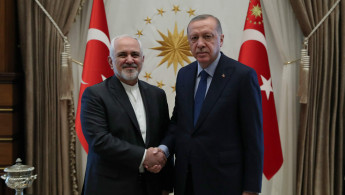Turkey criticises US for designating Iran's Revolutionary Guards as a 'terrorist organisation'
Turkey has criticised the US decision to designate Iran's Islamic Revolutionary Guard Corps [IRGC] as a terrorist organisation on Wednesday.
Speaking at a joint news conference with Iran's Foreign Minister Mohammad Javad Zarif, Turkish Foreign Minister Mevlut Cavusoglu said the decision is a dangerous development that could lead to chaos, stressing that US sanctions were harming the people of Iran.
Zarif arrived in Turkey after visiting Syria where he met President Bashar al-Assad on 16 April.
Iran's Foreign Minister said he would speak to Turkey's President Recep Tayyip Erdogan about his talks with Assad, adding that Iran wants to help Turkey and Syria maintain "good relations."
Criticising the US president’s decision, Cavusoglu said "when we start adding other countries' armies to terror lists, then serious cracks will occur in the system of international law," warning that "trust in the global system will decline and total chaos will ensue."
Trump and US Secretary of State Mike Pompeo announced the move against the Revolutionary Guard last week.
Trump said in a statement that the "unprecedented" move "recognises the reality that Iran is not only a State Sponsor of Terrorism, but that the IRGC actively participates in, finances, and promotes terrorism as a tool of statecraft."
Trumps’ designation adds another layer of sanctions to the powerful paramilitary Iranian force and makes it a crime under US jurisdiction to provide it with material support.
"Our conscience does not accept that the brotherly Iranian people be punished," Cavusoglu said of Trump’s administration sanctions against Iran. "Such steps put regional stability, peace, calm and economic development under risk," he added.
Russia, Iran and Turkey, which back rival groups in Syria's conflict, have been sponsoring talks in Astana, the capital city of Kazakhstan, to end the eight-year conflict.
The Astana process was launched after Russia's military intervention in Syria tipped the balance in favour of the Syrian regime and has gradually eclipsed previous UN-sponsored negotiations scheme known as the Geneva process.
Early this week, Kazakhstan's foreign ministry confirmed in a statement that delegations from the Syrian regime as well armed opposition groups will take part in new talks in Astana, scheduled for 25 and 26 April.
The talks will also include representatives of the three guarantor states, Iran, Russia and Turkey; while the United Nations and Jordan are expected to attend as observers.





 Follow the Middle East's top stories in English at The New Arab on Google News
Follow the Middle East's top stories in English at The New Arab on Google News


